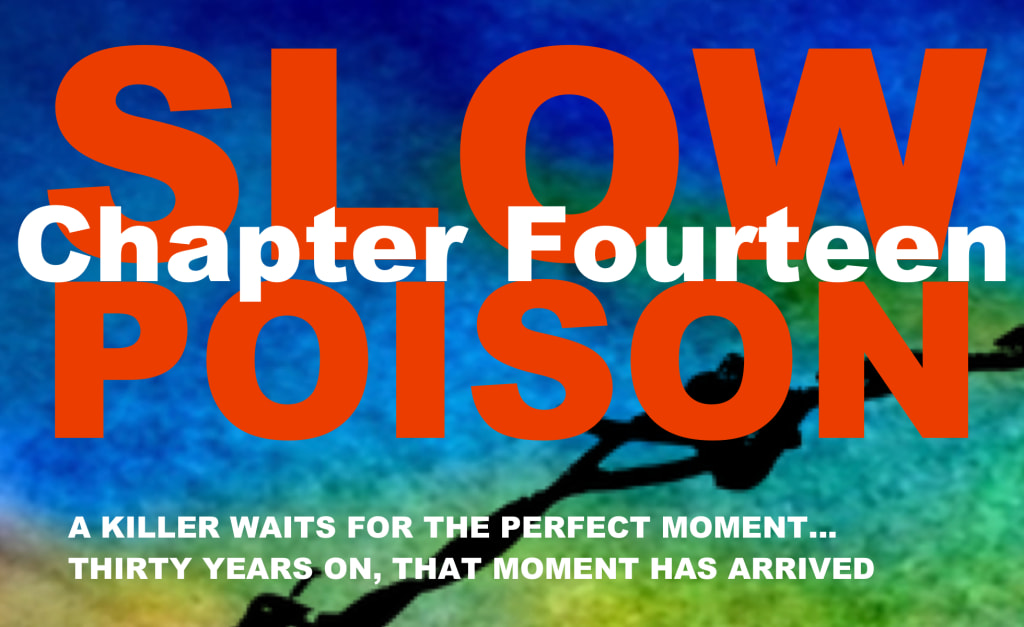Slow Poison - Chapter Fourteen
Chapter Fourteen

Chapter Fourteen
Cheltenham. January 14th
Since Monday the snow had been falling monotonously, quietly. Blowing in great drifts, filling up the dips between the hedgerows, the wind levelling out the peaks into one smooth layer of white sugar frosting. Around the hollow of the town, tree tips peeked through the hilltop blanketing, like saplings searching for spring. But spring was nowhere in sight as the snow floated down relentlessly from the low grey cloud. In the valley the steady stream of traffic and scuffing children had turned the unique crystals that lay briefly in the streets into a leaden slush that stuck to everything, leaving hardy stains on gloves and shoes and woollen socks.
Lenny tried the door again, his weak fingers around the bitter cold iron door knob. He could not budge it. It had been bolted from the outside. The back door led into an enclosed courtyard. The walls rose up like a lift shaft several stories high. The snow had filled the space eagerly and lay piled up to the second floor windows. Lenny remembered seeing a film where someone had boiled snow to drink. Survive. That was it. Survive.
Where was the man? Where was the snow? The pain of want took him, left him shivering, retching, cold and hungry. The need. Where was the man? Lenny wanted to scream. To scream so loud that the man would come and help. But Lenny had screamed in the past, had screamed for a full hour, but it had done no good. The man had not come. Not when he had screamed. He had come in his own good time. And it was good. When the man had come. Oh, so good.
Cigarette. There must be some threads somewhere. Lenny crouched upon his hands and knees, scrabbling at the upright butts of a thousand cigarettes. They were long dead. Spent soldiers, ghosts and dreams. The drawers. There would be threads in the drawers. There was an old dresser mouldering away against the party wall. Lenny pulled each drawer on to the floor and picked at the dust and damp strands among the old papers. There was enough. Paper. Something thin enough to roll around the remnants of stale tobacco. The last of the Rizla was long gone. Toilet paper would have been perfect, but there was nothing left on the grey cardboard rolls but streaks and stains. There were receipts in the drawer; restaurant receipts, bills from past hotels. One of those would do.
Lenny grabbed an old bill from the Cross Keys in Peebles. What a sunny day that had been. Lenny and the man, cold in their room, fresh from the river. Gnats. There had been gnats hovering above the water. Lenny rolled the crumbling tobacco into the Peebles bill, fashioning a crude cigarette, held together with his spittle. Matches. There must be matches. Please god dear god let there be matches please please. Lenny began to breath faster, panic taking him to frightening heights. Beneath the debris of the drawers, the mildewed memories, there were matches. Dead, damp, useless matches.
“Oh god fucking fucking hell.”
He pulled the drawers, each one, from their frames and there were broken things cascading down, hurting his toes and shins. There was crockery and wood, scratched records, tangles of African sandalwood beads and a die cast metal shape with flaking paint. Muffin’s fetlock. No matches. Lenny broke into a cold sweat. Where was the man? He would bring matches. He would bring the stuff. Oh god. Where was the man? Oh please dear god send the man please dear god oh fucking fucking shit.
Hell had begun in earnest.
LENNY BEGAN A LOW WAIL. “Oooooom ooooooom”. Where was the man? He must come. There was a loose corner of wallpaper on the wall above the dresser. Lenny leaned over and peeled a thin ribbon away from the damp wall. Where was the man? Lenny littered the floor with more strips. The smell of paste and wet plaster filled the room. In an hour the wall would be as bare as the others, the inch wide strips painstakingly peeled into faded Sanderson curls. Tomorrow Lenny would begin the task of prising the floorboards away. Where was the man? Cold. So cold. Matches. Where were the matches? The man would bring them. Lenny pulled his blanket around his shoulders as the last of the daylight faded. A distant bell chimed three.
Lenny was unconscious when Trim let himself into the dark basement flat. He retched slightly in the stench. What was that smell? Shit? He knew that. No. The other smell? Decomposing flesh? Death? No - he must keep him alive. Just a little longer. He kicked the festering bundle into consciousness and put the Sainsbury’s bag against the dresser. In the bag was bread and milk and chocolate. Lenny hunched inside his blanket. He ignored the bag.
“Have you got the stuff?”
His breath smelled putrid as the words scraped past his cracked lips. His teeth had long since been removed. Trim said nothing. He stood in front of Lenny, close, unzipped and relieved himself over the upturned face. Half erect he rammed into the toothless face awash with his urine, holding the thin greasy hair of the head below him. He felt sick. This was the last time. It had to be. It was time to relinquish all of the habits. He had told himself that so many times. He came in a rage of frustration and anger, pumping long enough to almost choke the doll. There was no feeling of satisfaction. There was hardly any feeling at all. As he came, he inhaled the vile stink of death and shit and mildew. He thought of the old man. Remembered some of his words. He looked down and noticed that his zip had scratched the face, making it bleed.
He pushed the mouth away. He went to the toilet to urinate, almost throwing up at the sight of the infested excreta among the broken porcelain. The derelict Stonehouse halt had been like this, long after the Dudbridge Donkey had ceased its slow journeys through the valley. Trim held himself back. He opened the back door for air and was confronted by the wall of snow. He stepped back one pace and aimed a steady stream at the snow, cutting a golden arc in the packed snow like a laser beam through steel. He shook himself and zipped up, turning and leaving the door open, allowing the foul air to soak into the tainted snow like blotting paper.
“Have you got the stuff...please...for Crissakes.”
Trim removed a brown padded envelope from the Sainsbury’s bag. Inside the envelope were several cellophane packets and a number of hypodermic syringes, each sealed in a plastic bag marked with a faint red cross. Sterilised needles. And the stuff. Lenny had never seen so much at one time. Oh, kind man, Peebles man. ‘Go on, just try it. There’s nothing like it. Come on, Len, love...For me. I know you’ll do it for me.’
He had been so sweet and kind, the man. His touch, his voice, everything. And it had been so good. Everything. The first sharp prick of the needle straight into the virgin vein. The pure, incomparable beauty of the rush that filled him, and then the cool, deep kiss of the man, the loving touch, all heaven meshed into one exultant, glorious moment. The foetal, arching, growing spring feelings that still came with the man. Kind man. Today must be a special day. Good man. Kind man. Man make him warm.
Trim turned and walked over to the small electric fire mounted on the wall. He put fifteen fifty pence pieces into the meter, and placed two dozen more in a pile on the floor. The fire spat into life, sending up smoke in a series of puffs as the dust of weeks ignited. The fire sent an unaccustomed glow into the dark room, lighting Lenny’s green skin with an almost healthy glow. Love the man. Did he love the man? He could. Now. Now, he could love anything. Kind man. Lenny’s hands were shaking, and he could not remove the needle from its blister pack, his raw bitten nails gave him no hold on the hard plastic. Trim turned and saw. He ripped the pack from Lenny’s fumbling fingers. Strong man. Kind man.
“The stuff, please, the stuff.”
The needle slipped into a scarred bruised place high on Lenny’s left arm, filling him with light as the room fell away.
Light and Sunshine and Summer Days and the sound of chickens and crickets and the taste of willow sap and Marmite sandwiches. The junk roared through his senses with the fury of the Bristol express, sparks flying from the spinning farthing that bit into the gravel along the railway track.
“Sod off, it’s mine!”
“Give it yer, our Fred!”
Lenny felt Fred’s strong fingers around his wrist, squeezing pain into his arm. Trim twisted the needle as he removed it from the emaciated arm. He could never resist giving him the extra pain. Lenny felt Fred’s great weight above him, grinding khaki against the skin, kneading his genitals. Then came the punch.
“Bloody got it, aint I.”
Tears. Yes, tears fell. With one hand Fred held the deformed coin aloft, the other clamped around Lenny’s hairless crotch, pain through stinky cotton.
“Stop snivelling, our Len, shut up, willya.”
“Awww Fred.”
“Oh, bugger off. I’m gonna have a wank.”
Fred disappeared into the head high grasses and pulled frantically at his boy-cock as another train roared by. Little droplets of sperm flew out like cabbage whites, lighting on the poppy heads. Lenny approached the waving grasses.
“Wot you doin’ Fred?” he sniffed.
“Bugger off.”
“I want to an’ all.”
“Yours is just a tiddler. You can’t do it.”
Fred whirled round, exposing himself. And Lenny could see. Fred’s was bigger. Big and brown, the tip glinting pink in the sun, a tiny drop of sperm dangling like a pearl. There was silence. Thought.
“Oh, come here then, you little sod.”
Lenny moved forward, fascinated, lips slightly apart.
The door slammed as Trim left the basement flat. He pushed the rusted bolt across, turned the key in the lock, shutting behind him the dim red glow of the electric fire, the steam that hung about the walls and the condensation that dripped behind the roller blinds. Trim looked back at the house, at the boarded-up windows, its ‘For Sale’ sign. What would Rebecca make of this desirable little property, he wondered.
Alan Bellamy sat in the front seat of the Range Rover reading The Guardian.
“It says here that the snow hasn’t been this bad since ‘47. I can remember ‘63. That was bad. Please Please Me came out then. Dad hated it. D’you know, he told me that there were POW’s that cut a tunnel through the snow up by Ciren. For the lorries to get through. To the farms. Did you know that?”
Becky was angry. She was angry with Alan. Angry that he had even considered bringing her up here, knowing that the snow was so deep. Angry that he chose to berate her with useless snippets of trivia that only made things worse.
“What time do you make it, Becky?”
“It’s almost three. It’s almost dark, too.”
He turned to look at her. There was annoyance in her voice.
“Look, I’m sorry. I shouldn’t have brought you up here, I know. It was only that stupid call from our rock singer. He should have been here ages ago.”
“If he’s got any sense, he’ll have stayed up in London. I’ve never seen snow this bad. I’m frightened, Alan.”
“Look, if it makes you feel any better, we’ll forget the house. He’ll probably call to say he’s not coming anyway. I suppose I was just seduced by the thought of a good sell.”
“Let’s just get back, can we?”
“I’ll give him a call.”
But the car phone was dead.
“All right, we’ll stop at a phone box on the way down. Okay?”
Alan folded his newspaper and started the motor. He turned to look at her.
“I’m sorry, Becky...I really am. Anyway, why everyone should want to live in the Cotswolds is beyond me sometimes. That royal bunker won’t hold them all.”
Becky was worried about Sarah. Janet had become less of an easy option. There were few alternatives. She could ill afford any more days at Mrs. Trim’s. But Becky depended on her job. For the material rewards and for her sanity.
The range Rover skidded as they turned into the snowbound lane.
“Careful!”
“Don’t worry. Four…”
“Four wheel drive. I know.”
“Sorry. I do repeat myself, don’t I? It’s the salesman in me.”
They began the slow crawl down into the Stroud Valley, stopping at three telephone boxes on the way. None of them were working. Becky turned the key in the lock of the front door at six thirty. The house was deserted. She looked across at the Woods” house and was relieved to see Sarah waving to her. The phone rang. Becky ignored it and left the house to resound with the ringing. Not all lines were dead, it seemed.
Cheltenham, January 14th, Midnight.
The blaze was well under way by the time the emergency services were contacted. Even at this late hour, the sirens had attracted a large crowd of onlookers. The fierce heat of the blaze, combined with the freezing conditions, made the fire fighters’ task extremely difficult. The fire had taken hold and the water spouting from the fire hoses seemed to make little difference. When the engine’s supply had dried up, the problems would begin. There were few sources of water in the entire town that were not frozen solid. The hydrant in the street was no exception.
“Bloody good thing the row was derelict.”
“Right, Sarge, what do you reckon we should do now?”
The Fire Officer thought for a moment.
“Well, I’m not risking any manpower. Are you positive the premises are empty?
“Yes sir, the squatters at 39 and 41 are out. They knew who was in and who was out.”
“Insurance job, you reckon?”
“Could be, sir.”
Noise threw itself across the crowded street. The roar of fire, four stories high, the explosions of glass and the snap of wooden beams. The block of Georgian houses were all a blaze of light, cracked plaster shells, a decaying suburban Manderley showering sparks into the snow.
The Press arrived.
“What have we got? Sergeant Price, isn’t it?”
“Preece! I don’t know. Whatever the cause, we won’t know for a while. We can’t get near it. And don’t any of you lot try!”
“No chance of anyone in the building, is there?”
“No, we ruled that out pretty quickly.”
“Insurance job?”
“Look, excuse me. I have to round up my men. Ask the squatters.”
The crowd had grown. Kids, neighbours, passers-by, all huddled in their winter coats. Suddenly there was a loud crash. The crowd jumped back as a torrent of sparks rained down, hissing in the slush, lighting up the flushed faces. The roof of the central building had collapsed. This house, most likely the source of the fire, was now completely gutted. The entire weight of four stories, roof and all, now lay burning ferociously in the hollow of the basement. A fitting funeral pyre. Lenny’s body would not be found for more than a month. First the fire would cool and the debris would harden, but then the snow began with a vengeance, covering tracks before they were made, sealing evidence before it could be found, putting off the final verdict until the thaw.
Trim moved on long before the last of the onlookers had called it a night. Long before the last of the fire engines had swerved back to the depot, long before the last of the sparks had died in the gentle snowfall. At two in the morning he watched his reflection limp slowly by in the windows of Cavendish House. He walked aimlessly on toward the Queen’s Hotel, toward Montpellier, smoking an endless chain of cigarettes. Late traffic swished past on the wet roads. He knew no one. In the strange semi-darkness of the outskirts of the town, the Montpellier caryatids glowered down from their Regency pilasters, looking for all the world like the Saint Cyr’s gargoyles, with faces to frighten the Dandies.
The snow flurried down around him. His last cigarette had been smoked. He felt in his pockets for small change. There was none. All of his small change lay fused together in a blackened mound under the tons of burning debris in the bolted and boarded basement flat. He shuddered and turned to walk the slow decline that would take him home. In the distance, under the shadow of Cleeve Hill, he could just make out the glow of the fire, spiralling sparks up into the snowy cloud.
“Goodbye Lenny,” he said out loud, "Almost even."
About the Creator
David Philip Ireland
David Philip Ireland was born in Cheltenham in 1949
David has published work in music, novels and poetry.
To discover David’s back catalogue, visit: linktr.ee/davidirelandmusic






Comments
There are no comments for this story
Be the first to respond and start the conversation.